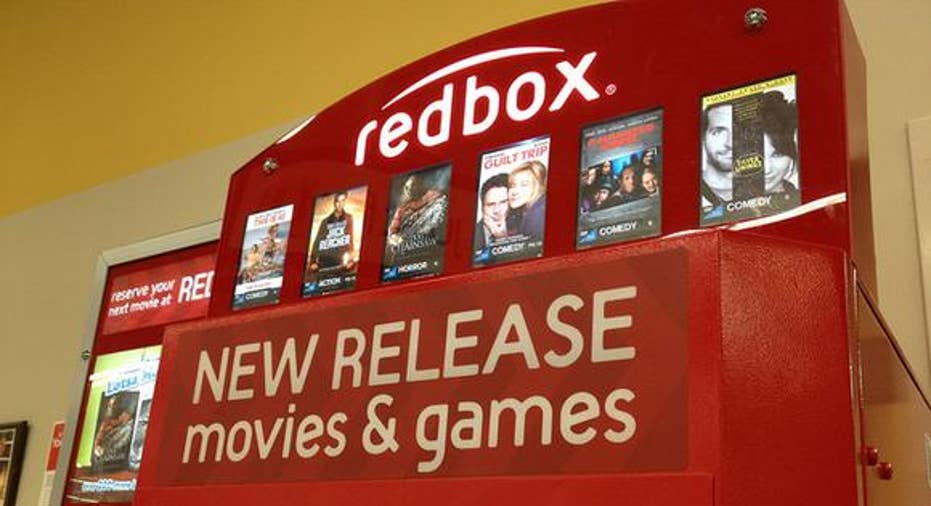2 Lessons Learned From the Rise of Netflix, Fall of Redbox

Things continue to get worse for Redbox parent Outerwall . The company behind the chunky vending machines that spit out DVD, Blu-ray, and video game rentals is lowering its overall outlook because its Redbox business isn't doing so hot.
Outerwall is slashing its guidance on both ends of the income statement for all of 2015. It sees total revenue clocking in between $2.165 billion and $2.19 billion, down from the $2.205 billion to $2.24 billion it was targeting in late October. It is also now forecasting an adjusted profit per share of $7.65 to $8.15, well short of the $8.82 to $9.52 it was rolling with originally.
The scrubbed outlook gets uglier when you consider that this is for a year that's just about done. If we strip away the first three quarters we're looking at core earnings from continuing operations of just $0.37 a share to $0.87 a share for the holiday quarter. Just six weeks ago Outerwall's target was for at least $1.54 a share and as much as $2.24 a share.
Outerwall is laying the blame on Redbox, and that's not a surprise since it accounts for more than three-quarters of its business. Redbox's president is stepping down, and it's not likely to be an attractive job for an aspiring executive. We're just not renting DVDs the way we used to and that's not going to change. Outerwall may have cheered the closure of the remaining Blockbuster stores two years ago -- and even Netflix has seen its DVD-receiving subscribers shrink sharply since peaking five years ago -- but it was merely a matter of time before it began feeling mortal.
Outerwall's stock opened nearly 20% lower on the news, hitting its lowest levels in three years. Netflix, on the other hand, is thriving. It was the S&P 500's biggest gainer in 2013, and it has a good chance to lead the way in 2015. Netflix isn't slashing its guidance. It's been routinely surpassing its forecasts. What did Netflix get right? What did Outerwall get wrong? Let's look at the two big lessons that all investors can learn in comparing the two companies that seemed to be fierce competitors several years ago.
1. Be the first moverNetflix has been offering video streaming since 2007, three years before its DVD subscriber base would top off at 20 million. It didn't wait until it saw the writing on the wall. It grabbed the crayon and dictated its own narrative.
Netflix reached out to video game console makers before set-top streaming devices became popular to bridge the gap between PC streaming and seamlessly watching online video through your home theater. Netflix reached out to the makers of Web-tethered Blu-ray players to get Netflix buttons on remotes, all while Redbox was wedging its way into those same boxes with coupons for free disc rentals.
The end result is that Netflix's base of members receiving DVDs and Blu-rays by mail has fallen to 5 million, but that has been more than offset by the 69.2 million streaming subscribers worldwide. Outerwall waited too long to launch Redbox and by the time it did Netflix's catalog of available digital titles was too substantial to duplicate. Redbox Instant rolled out in 2013. It was shut down in 2014.
2. Let your brand stand for convenience -- not valueAs much as Netflix fans would like to think that they're the ones that destroyed Blockbuster, we have to give this one to Redbox. It had the same product -- a physical disc -- at a lower price than Blockbuster. It offered the same level of instant gratification as Blockbuster, and while it wasn't necessarily more convenient -- you still had to make a trip to rent a flick and a second trip to return it -- it was a great value proposition.
Netflix's main selling point wasn't value when it came to its now fading DVD business. One could go through more than a half-dozen Redbox rentals for the price of a month of Netflix. However, it offered the convenience of never having to leave home. It also offered a much broader selection than the discs that can be jammed into a Redbox kiosk or even a Blockbuster store. It's that same breadth of offerings and ease of access that fuels its booming online business today.
Both companies were at the right place at the right time a decade ago, but only Netflix realized that it needed to be somewhere else in the future.
The article 2 Lessons Learned From the Rise of Netflix, Fall of Redbox originally appeared on Fool.com.
Rick Munarriz owns shares of Netflix. The Motley Fool owns shares of and recommends Netflix. Try any of our Foolish newsletter services free for 30 days. We Fools may not all hold the same opinions, but we all believe that considering a diverse range of insights makes us better investors. The Motley Fool has a disclosure policy.
Copyright 1995 - 2015 The Motley Fool, LLC. All rights reserved. The Motley Fool has a disclosure policy.



















